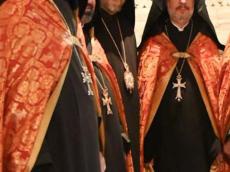|
|
TODAY.AZ / World news
The Armenian Church may have been involved in Israel’s attack on Iran
16 June 2025 [11:09] - TODAY.AZ

By Bayram Elshadov
A recent precision operation deep inside Iranian territory continues to raise questions that Tehran itself has yet to fully answer. How was Israel able to carry out targeted strikes without significant on-the-ground support? How did Israeli intelligence penetrate some of Iran’s most secure facilities?
Among the lesser-discussed but strategically significant factors is the role of the Armenian Apostolic Church in Iran—a unique institution that is not only officially recognized but also enjoys broad autonomy. With international communication channels and deep roots across the Armenian diaspora—from Los Angeles to Beirut, from Yerevan to Paris—the Church stands as a rare Christian structure officially operating within Iran.
This prompts an increasingly asked question in Iran and beyond: could this network have served as a logistical or intelligence asset for Israeli operations? So far, no official denials have been issued.
Iran is home to over 15 Armenian churches, including in strategically sensitive cities like Isfahan, Tabriz, and Urmia—locations where, according to the IDF, underground facilities were struck. These cities are longstanding centers of Armenian religious and cultural life, frequented by clergy, diplomats, delegations, and humanitarian shipments. Such activity can provide plausible cover for the movement of communications equipment, instructions, or even personnel.
For Israel’s intelligence services—among the world’s most capable—such a discreet and autonomous network could be a goldmine. Clergy crossing borders under “peaceful” missions raise few questions. Religious parcels are rarely subjected to detailed inspection. Communications between dioceses abroad remain secure and beyond the reach of conventional surveillance.
One factor often overlooked is the political stance of parts of the Armenian clergy and diaspora. In recent years, rhetoric among some Armenian figures has turned sharply anti-Iranian, fueled by anxiety over the growing Iran–Turkiye–Azerbaijan axis. Sympathy for Israel and Western states is becoming increasingly pronounced. In such a climate, cooperation with Israeli services is seen not as betrayal but as “resistance.”
Also noteworthy is Armenia’s warming ties with Israel since 2023, marked by the restoration of diplomatic missions and discussion of joint initiatives. It’s plausible that the Church’s network has been integrated into a broader framework that includes official Armenian state institutions.
The Armenian Church is more than a religious body—it is a historic channel for diplomacy, logistics, and intelligence. Using this network for covert deliveries, disguise, coordination, or even recruitment is far from an unprecedented scenario. Religious missions have long been used for secret diplomacy and espionage—from the Vatican to the British Crown, to American covert operations.
Why wouldn’t Israel employ a similar mechanism—especially one involving a motivated, internationally connected, and state-recognized Armenian Church?
Unlike other minority groups in Iran, Armenian clergy enjoy freedom of movement, international access, and a degree of legal immunity—making them ideal couriers for sensitive missions, especially if they see themselves as taking part in a moral crusade against regimes they oppose.
If confirmed, this would mean the Church is not merely a spiritual presence but an active component in a covert intelligence architecture—quietly embedded within one of the most daring operations in the region.
URL: http://www.today.az/news/regions/259890.html
 Print version
Print version
Connect with us. Get latest news and updates.
See Also
- 01 September 2025 [23:23]
Tariffs prompt Brazil to diversify export markets - 01 September 2025 [21:50]
Automakers and government team up for next-gen mobility innovation - 01 September 2025 [20:50]
Music added to Telegram profiles - 01 September 2025 [20:21]
Russia bans travel ads on social media platforms - 01 September 2025 [19:50]
Extraordinary NATO-Ukraine Council Meeting to be held today in Brussels - 01 September 2025 [13:00]
Kyrgyzstan assumes chairmanship of Shanghai Cooperation Organization - 01 September 2025 [08:00]
Scientists spotted a 'Yellow Brick Road' at bottom of Pacific Ocean - 01 September 2025 [08:00]
Scientists spotted a 'Yellow Brick Road' at bottom of Pacific Ocean - 31 August 2025 [23:00]
Chelsea striker heading to Bayern as record loan fee agreed - 31 August 2025 [18:30]
BIG: Throughout history, France has carried out bloody repressions and genocides against African-origin peoples
Most Popular
 Azerbaijan–China relations: political and economic panorama [ANALYSIS]
Azerbaijan–China relations: political and economic panorama [ANALYSIS]
 Azerbaijani President Ilham Aliyev holds meeting in Tianjin with Chinese President Xi Jinping [PHOTOS/VIDEO]
Azerbaijani President Ilham Aliyev holds meeting in Tianjin with Chinese President Xi Jinping [PHOTOS/VIDEO]
 Hikmet Hajiyev: President Ilham Aliyev to hold meetings with leading Chinese companies
Hikmet Hajiyev: President Ilham Aliyev to hold meetings with leading Chinese companies
 UN Security Council to discuss European push for Iran nuclear sanctions reinstatement
UN Security Council to discuss European push for Iran nuclear sanctions reinstatement
 Russia can not reclaim frozen assets without paying reparations to Ukraine, says EU official
Russia can not reclaim frozen assets without paying reparations to Ukraine, says EU official
 Weekly review of Azerbaijan’s precious metals market
Weekly review of Azerbaijan’s precious metals market
 President Ilham Aliyev meets with Acting Head of China Energy Engineering Corporation Limited Ni Zhen in Tianjin [PHOTOS/VIDEO]
President Ilham Aliyev meets with Acting Head of China Energy Engineering Corporation Limited Ni Zhen in Tianjin [PHOTOS/VIDEO]
